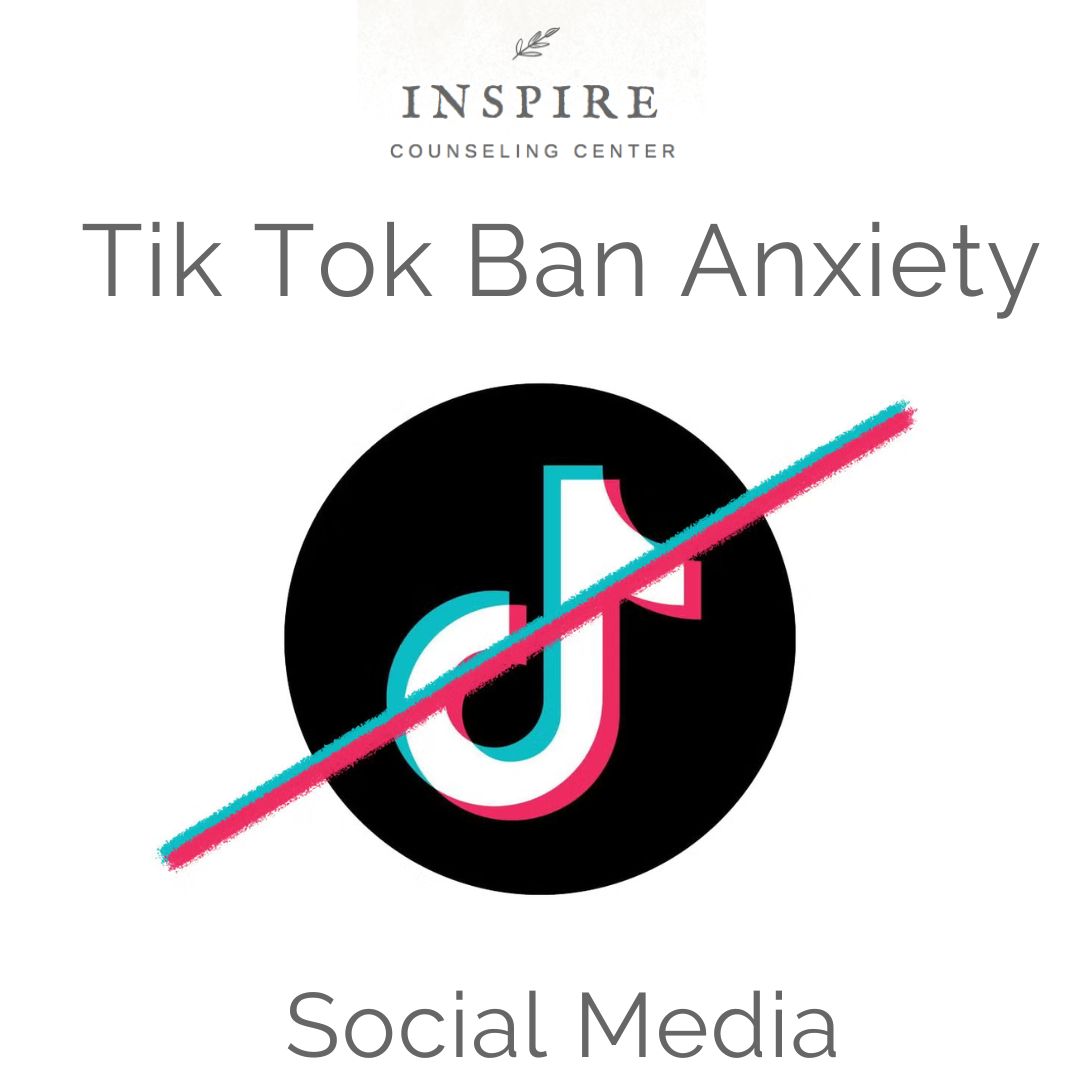
TikTok Ban Anxiety: Understanding and Coping
When TikTok went offline in early January, the extraordinary blackout did not go unnoticed by 170 million American users. As a parent of teenagers, and the owner of a counseling center serving thousands of kids, teens and parents–this outage and possible future TikTok ban has been a hot topic.
The TikTok outage, which was less than 24 hours, made it hard to ignore the impact social media has on our kids lives, and our own. Now, with a potential future ban of TikTok — an underlying anxiety has been stirred up for many, leading to what we’re calling “TikTok Ban Anxiety.” This feeling stems from concerns about losing access to the platform that many have come to rely on for entertainment, community, and even career opportunities.
What is TikTok Ban Anxiety?
TikTok Ban Anxiety is the stress and worry that users experience at the thought of the platform being banned. For many, TikTok is more than just an app; it’s a significant part of their daily routine and social interaction.
The uncertainty surrounding its availability can lead to:
- Fear of Disconnection: Losing a key avenue for communication and self-expression.
- Change in Routine: Disruption of habits that revolve around TikTok use.
- Social FOMO (Fear of Missing Out): Anxiety about missing trends, news, and viral content.
- Loss of Income: For influencers and creators who depend on the platform for revenue.
Take the Opportunity to Check-in with Your Child about Social Media
First, this is a really great and natural opportunity to check-in with your kid about social media. While there are several (and valid) reasons parents have concerns about social media, it’s important create a space in which fosters honesty, transparency and curiosity.
It’s also important to remember that kids do best in relationship with their parents.
There’s a wise old saying, “Rules without Relationship lead to Rebellion.”
The relationship you have with your child is the strongest hope you have at empowering them to make good choices for themselves, with social media and everything else in between.
How do you have a conversations that builds your relationship, while empowering your kids and addressing the hot button issue of Social Media?
- Make sure your tone is approachable and respectful, just as if you were talking to a friend. If you’re frustrated or upset, your conversation may seem like a lecture or scolding, which shuts down the line of communication.
- Make sure you and your child are in a neutral mental space. When kids first get home from school or an activity, it’s often not the best time to connect, as their brain needs time to process and rest. Some better times can be when you’re driving in the car, saying goodnight before bed, or when they’re eating a snack in the kitchen.
- When you talk with your child, listen to their reasons why it’s upsetting, unfair, and validate their feelings (without interrupting or correcting)
- Be curious and ask your kids what’s important to them about TikTok or social media
- Find a way to connect and relate — share a time when you felt upset something was taken away from you, or you couldn’t talk to your friends, etc.
- Admit there are positives to social media: Social media provides a wealth of information, making it easier to stay informed about world events and educational topics. Social media gives learning tools with tutorials and educational content. Kids and teens can use social media to share their creative works, such as art, music, and writing, with a broader audience. There are positives, but people need to be informed about both sides to make their best choices.
Share Facts & Science with your Kids to Empower Them to Make Good Choices
When you have listened, validated and curiously talked with your kid, you’ve earned the opportunity to tell them your concerns. Working in the psychology field, I am a big fan of sharing science and facts with kids, letting them make their own opinions and helping guide them toward a healthy conclusion, rather than scare tactics, extreme possibilities or just flatly being told “Get off your phone.” Kids like being treated with respect. Who doesn’t? When they feel part of the decision, there is so much more commitment.
Here are some facts you can share with your kids to empower them. Let them know you respect them and because of that, you think they should know some important facts and truth about social media.
Science Facts about Social Media:
- Because social media is so new to humanity, we don’t have true long-term studies showing the effects it does to our brains
- What we do know is that during adolescence, the brain goest through major changes can be very influenced by social media.
- Dopamine, is an important chemical in our brains that makes us feel happy, it’s a reward to help us survive. We only have a limited amount. Dopamine is supposed to be released in small amounts when we do rewarding things like eat food, wear comfortable clothing, find shelter or a partner to love. Nature designed our brains to feel happy when these things happen because they increase our odds of survival.
- Experts from Stanford show social media and apps can cause the release of large amounts of dopamine into our brains’ reward pathway all at once, just like heroin, or meth, or alcohol.
- When we release all our dopamine at once, we run out of the “feel good feeling.” It makes it harder for regular things to make us happy, like hanging out with friends, baking, walking outside, talking to family, exercising, etc.
- When we deplete our dopamine regularly, it becomes harder and harder for us to feel that excitement and happiness
Other Facts about Social Media:
- Social media can be a platform for bullying, it’s important to be kind and assume that everyone will be reading anything you post and to tell someone if there’s someone making you feel uncomfortable.
- Social Media can show upsetting or inappropriate things that can make you feel upset, grossed out or anxious
- Social Media shows people with a perfect online persona, that can make people feel less-than or lead to anxiety and depression.
-
There are people who spend a lot of time, trying to trick others for money, information or just more followers.
-
When you’re using social media, you’re not doing other things that can impact your academic, athletic and other goals.
Remember, while the landscape of social media is daunting, any small positive steps can make a difference. Use the anxiety associated with the potential ban of TikTok to talk about the importance of using social media in a way that helps your life, not hurts it.
If you’d like to personalized help with Social Media addiction or anxiety, we are here to help! Call us at (847) 919-9096. To see a list of all our Clinical Therapists and Clinical Interns, click here.
Support is just a call, text or email away.
Call or text (847) 919-9096 or email hello@inspirecounselingcenter.com




